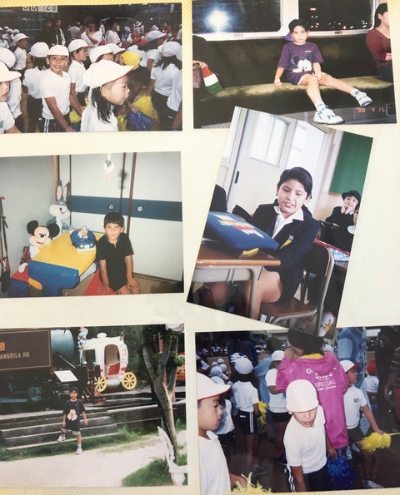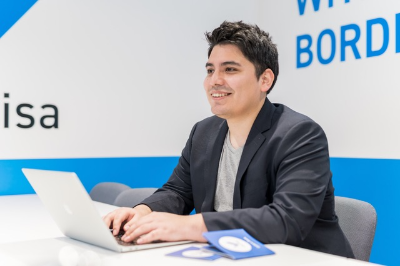It was a natural choice for me to start a business.
Mr. Albert Okamura
Mr. Albert Okamura has attracted attention as an entrepreneur, having been selected as one of the “30 under 30 who will lead the next generation” by Forbes Japan. Born to a Japanese father and a Peruvian mother, he came to Japan at the age of six. With the mission of “eliminating national borders from the world,” he is currently developing his business with a focus on “one visa,” a service that simplifies visa acquisition. Mr. Okamura, who was educated in Japan and is active as a business owner, shared with us his personal journey and advice for children with immigrant background.
Mother’s desire to focus on education brings him to Japan
― Your father is Japanese and your mother is Peruvian, how did you come to Japan?
Coming to Japan was one of my mother’s life plans. My mother came to Japan from Peru as a government-sponsored student when she was 16 years old. At that time, Japan was the fastest-growing country in the world economically, and it was also attracting attention in terms of education. When my mother actually came to Japan, she felt very comfortable in terms of culture and socializing.
In developing countries, there are many people who do not have good opportunities for education, and my mother wanted to raise her children in Japan. Since my father was Japanese, we decided to move to Osaka when I was six years old, when my compulsory education started.
― What was your father like?
He is a man with a challenging spirit who also runs his own business.
― Did you enroll in a public elementary school in Japan?
That’s right. However, I changed schools a lot, and I changed schools four times when I
was in elementary school.
― Did you enroll in a public elementary school in Japan?
That’s right. However, I changed schools a lot, and I changed schools four times when I was in elementary school.
– Since you came to Japan when you were in the first grade, did you have much difficulty in learning the language?
I think that no matter how old you are, you will have a certain amount of difficulty, but I do think that the way you absorb things changes with age.
At the first elementary school I attended, there were Filipino twins and one Korean child, but I was the only one who was instantly recognizable as a foreigner, so I was bullied. But it wasn’t something that lasted very long. I think I was able to avoid it by having people around me recognize me as a fun guy. However, I had to change schools a lot, so it was difficult for me to get to know myself from scratch each time. I made an effort to get myself recognized each time I changed schools, and I think that was a good thing in the end.
Childhood experiences that led to entrepreneurship
Mr. Okamura was enjoying his elementary school life, but something happened that would have a major impact on the rest of his life. One of his classmates, who also had immigrant background and was a good friend of his, suddenly stopped coming to school. He later found out that his classmate had been deported back to his home country due to an incomplete application for a residence visa. Through this original experience, Mr. Okamura developed an awareness of the issues that led him to start his own business.

― You said that your friend suddenly disappeared due to a visa snafu. Was it an intense event?
That’s right. I was in elementary school, so of course I didn’t have detailed knowledge about deportation and residency status, but I felt a great sense of loss that my friends were gone. Later, as I became more knowledgeable, I gradually began to understand what had happened. When I compared it to myself, I wondered if my friend might have wanted to
stay in Japan longer, and what was wrong with my friend. I think that having such a different feeling from Japanese people became a weapon for me when I started my own business later on.
― How old were you when you decided to start your own business in earnest?
It was around the time when I started my business that I was able to verbalize the meaning of this experience, but I think it was around the time when I was a university student that I started to vaguely recognize it.
― When you were in junior high school and high school, how did you think about your future job and career?
In my case, it was very clear. My mother had always instilled in me that anything other than management was not a job. I think it was partly because my mother was a business owner herself, but I was always told that “work means creating something by yourself, not being forced to do something or doing a task. If you’re going to do something, you should do it in your own company,” is what I was always told growing up. So, starting my own business was a natural choice for me.
The ability to be aware of “differences” is a treasure
― Your first job was at the Tokyo Regional Immigration Bureau, right?
It was a private company that was entrusted with the operations of the Immigration Bureau. I had a deep-seated desire to start my own business in the future, but when I was deciding to go to university, I heard that Konan University had newly established an interesting department called the Faculty of Management and Creative Studies. What particularly stuck out to me when I listened to the description of the department was the emphasis on how academic knowledge is useful in practical aspects of the world. The department claimed to be taught by people who had always been able to do some kind of work in society. As I was allowed to give a presentation in class about the issues faced by the private companies that the professors were collaborating with, my interest in launching new
businesses grew.
When I was looking for a job, I was mainly interested in venture companies that could create new businesses, but even though I received several job offers, I began to wonder if this was a job that only I could do. If it was a company that was doing immigration work, I thought that there would be things that I could understand because of my immigrant background.
After working at the Immigration Bureau, Mr. Okamura noticed the inefficiency of the work. Especially for foreigners who do not understand Japanese well enough to apply for visas or renew their visas, the paperwork was very difficult to complete, and it was common to see more than 1,000 people queuing up at the counter each day to complete the procedures. Despite suggestions for improvement, the situation remained the same.
Therefore, he decided to launch his own service to simplify the documentation process, and in 2017, he released “one visa”, a web service to support visa application and management. Currently, the service is mainly for corporations that employ foreign nationals. On the other hand, with the enforcement of the revised Immigration Control Act, which aims to increase the acceptance of foreign workers, the company also launched a service to support specified technical interns. Although some of its activities are currently suspended due to the new corona, the company is preparing for further growth after the corona is resolved.

― As an entrepreneur, what do you recognize as “what you can do only because you are you”?
Not only for myself, but I think that being able to easily recognize “differences” is something that everyone with immigrant background has. In my case, I came to Japan when I was 6 years old, so it may not be that big of a difference, but if you come to Japan when you are in middle or high school, the difference you feel between the natural standards you have
formed in your mind and the standards of the place you moved to will be bigger. You will often suffer because you feel different from what you had imagined before you came, or because you are not accustomed to the culture, or because you feel a difference.
At first glance, this may seem negative, but there is a positive side to it. I once read an article in a media outlet that said that half of the leading IT companies in the U.S. were founded by immigrants or people with immigrant backgrounds, and that 80% of the founding members other than the founders were immigrants as well. Until I read that article, I had a vague understanding of “goodness with a difference,” but now I know that it is true from a business perspective as well.
I think that if you can verbalize your conflicts at the time you have them, such as writing down the differences between the good points of your home country and the bad points of the country you moved to, it will be very helpful in shaping your career. Clearing up the differences one by one will make it easier for you to imagine that you want to be a person
who can accomplish these things, or that you want to work for a company that can do these things.
Things that may seem negative at first glance, such as feelings of unfamiliarity, are like allergic reactions caused by differences, and if you face them as your own assets, they can become valuable treasures.
― I think that the ability to be aware of differences is very important not only for children with immigrant background, but also for Japanese children.
Yes, I agree. However, for children with immigrant background, they tend to use it as an excuse. While the excuse “I can’t fit in because I have immigrant background” protects you, it can also be a curse word that creates a wall between you and the people around you, so be careful.
The more foreign roots you have, the more you should consider your education important
― What advice would you give to children with immigrant background who are currently struggling with their careers?
People with immigrant background who have their own unique values can be a treasure trove. If Japan does not suit you by any means, there is no need to stick to Japan for the rest of your life. Japan has its good points and bad points, so it is okay to go back to your home country after clarifying those points, or even live in a country other than Japan in
some cases.
On the other hand, if you want to live in Japan as a person with immigrant background, you need to understand that your educational background is important. I can also say this about the ease of obtaining a status of residence. It cannot be denied that returning to your home
country may be regarded as OK if you have abilities even if you do not have an educational background. If you don’t have a university degree before you start worrying about your future career path, you may end up being unable to do anything by the time you realize it. Therefore, I would like you to be aware that there are some differences in motivation for studying at school compared to Japanese.
Interviewing and writing: Hiroshi Yoshida
▶ Another interview with Alberto Okamura, who was featured in this article, is also available on Keizai-Kai Web. Please check and read it.


